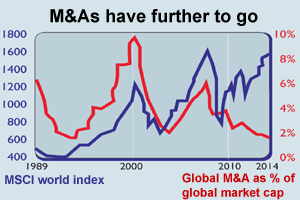
Broadcaster Fox’s $80bn offer for rival Time Warner was the latest big deal to hit the headlines this week. But it’s just the tip of the iceberg.
Deals worth $1.83trn were agreed worldwide in the first half of 2014. That’s up 41% on the same time last year, and it’s the busiest first half for mergers and acquisitions (M&A) seen since the height of the credit bubble in 2007.
There are several reasons for the M&A comeback. As the slow, but steady economic recovery has taken hold, firms have become more confident. They have plenty of cash with which to scoop up rivals and expand their exposure to promising markets: about $7.5trn, according to Thomson Reuters. Rising share prices mean that buyers who pay for mergers with stock (rather than cash) also have “a stronger currency”, says John Authers in the Financial Times. And as for debt financing, it has never been this cheap to borrow money. In short, “it really is a bit of a perfect storm when it comes to dealmaking”, says Frank Aquila of Sullivan & Cromwell LLP.
The boom looks set to continue. There are pockets of ‘irrational exuberance’ – drugmaker Merck offered to buy a biotech firm last month at 240% above its market value, for instance – but the market doesn’t look especially frothy yet. Alistair Gunn of Jupiter Asset Management notes that companies aren’t overextending themselves as they were at the top of the market in 2007.
Back then, companies typically borrowed too much cash and spent it on their targets. Today, they tend to use their own stock, or a mixture of stock and cash. Meanwhile, M&A represents only a small proportion of the total value of global stocks, compared to previous peaks, says Andrew Milligan of Standard Life. At the tops in 2000 and 2007, M&A comprised 10% and 6% of the combined value of global stocks respectively. Now the figure is under 2%.
The ongoing revival will reinforce, and be reinforced by, rising markets, says Authers in the FT. “Bid speculation helps raise the price of potential targets, while the aura of excitement and success around the acquirers helps ensure that their prices do not suffer as a result.” Of course, in the long run, M&A is “a great process for creating fees for bankers, and for destroying the value held by shareholders”. But expect the boom to continue for now.